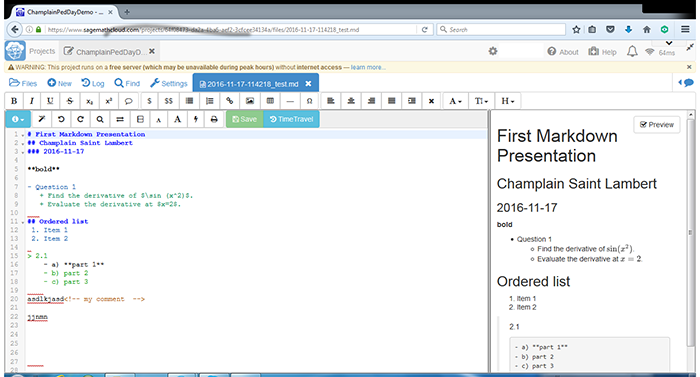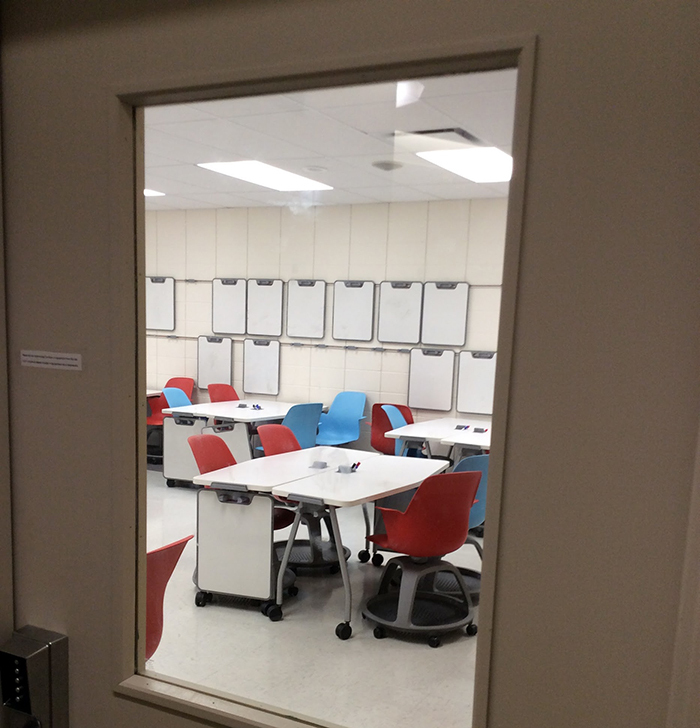Champlain Saint Lambert’s Fall 2016 Ped Day: The Future of CEGEP Education is In Good Hands

Champlain Saint Lambert (Photo courtesy of Champlain Saint Lambert)
On Thursday, November 17th, 2016, many members of Champlain Saint Lambert’s faculty, staff and administration turned out to participate in the Fall Pedagogical Day. With a keynote presentation about the future of CEGEP education, a variety of disciplinary workshops and talks on innovative technopedagogical practices, there truly was something for everyone.
By 8:30, there was already a buzz in Champlain Saint Lambert’s (CSL) student space, which served as the locus of operations for the ped day. By 8:45, the organizers had to send for more coffee, a good sign that the event would be well-attended!
Shortly after 9:00 a.m., James Sparks, CSL’s IT-Representative, took the podium to address his college’s community with some opening remarks. After some observations about local and international change, he informed the audience that the activities with the most registered participants were those that were related to the management of stress and well-being. With this is mind, he encouraged his peers to take a little time for themselves to recogize all that they do. He reminded everyone that we are educators, and that we share quite possibly the best vocation in the world.
The Future of CEGEP Education
Jim then introduced Gilbert Héroux, the current Director General of Collège André-Grasset, and former DG of Vanier College who’s presentation was entitled For Accessible, Inclusive and Innovative Colleges.
Mr. Héroux was closely associated with the working group that would eventually produce the Demers report of 2014 in the wake of the Printemps érable and the resulting Higher Education Summit that was called to address this historical social crisis. Mr. Héroux had early access to the outputs of the Demers report’s working committee, acting as a sounding board for the ideas that were being formulated.
The Demers report provided a series of recommendations to help allow the colleges to adapt to some of the current realities:
- Demographic decline
- Shortage of skilled workers to meet demands
- Diversified student profiles and atypical student paths
- Rapidly changing labour market needs
Fast forward to the summer of 2016, following the discontinuation of the working group in place to oversee the implementation of the recommendations the Minister of Higher Education, Madame Hélène David asked Demers and company to conduct a consultation on the possibility of creating a a Council of Colleges, inviting members of the college community to submit policy papers on the mandate, composition and other aspects of the future Council. This consultation also looked at the establisment of a Mixed Commission for Higher Education (colleges and universities) to discuss issues of common interest, and changes to the Règlement sur le régime des études collégiales (RREC).
The Council of Colleges may be called upon to implement 3 focuses of intervention mentioned in the Demers report
- Ensure accessibility to college students from a perspective of success and inclusion
- Ensure the viability of the educational offering throughout Quebec
- Strengthen the ability of colleges to implement programs of study
Part of the solution for the future resides in the accelerated development of information technologies and the proliferation of communication networks. Mr. Héroux reminded us that there are high expectations from students with regards to using new technologies in communications within the college and within their modes of learning. Inevitably, distance education was also mentioned as a tool that holds promise to meet the needs of colleges in remote areas.
After Mr. Héroux’s presentation, Jim Sparks presented to him the questions that had been previously submitted by members of the Champlain community.
To the Lab!
After spending a few extra minutes absorbing Mr. Héroux’s lecture and a brief chat with Profweb contributor Gabriel Flacks, it was time to move into the first series of workshops.
Blended learning, which combines in-class meetings with elements of distance education is very much on the radar of many teachers right now. Fortunately for the CSL Ped Day attendees, Gabriel Indurskis, who teaches Physics at the college, provided us with an inspring example of a tool that he is using in his classes as part of a workshop entitled Science Teaching with Online Tools. Gabriel initiated his workshop attendees into the world of Sagemath Cloud.

Screenshot of Sagemath Cloud
Sagemath Cloud is an on-line computational mathematics platform. However, Gabriel quickly showed us that the Sagemath platform has a much larger potential audience than mathematicians and scientists. It’s also useful for fledgling or experienced programmers, or anyone that would like an on-line space to create and edit documents, whether individually or collaboratively.
After a brief presentation of the platform Gabriel had attendees create their own accounts to test out the system. We did this to create a simple presentation in an easy formatting language called markdown.We were impressed by the number of different file types that could be created or edited within Sagemath Cloud. The Profweb team will take a closer look at the tool in an article in the Winter 2017 semester!
In the afternoon, Gabriel presented the second part of his workshop, touching on the Desmos and Geogebra on-line services which allow graphical visualizations of mathematical situations.
The workshop took place in room D-104, CSL’s Experimental Teaching Lab (ETL), with modular furniture that could easily be reconfigured for group work and mobility. The chairs in the room are on wheels and have storage under the seat for students to store their gear! These seats allow you to easily move from table to table which allows students to effortlessly interact with different groups.

Entrance of Champlain Saint Lambert’s Experimental Teaching Lab, Room D-104 (Photo courtesy of Champlain Saint Lambert)
Intermission
The CSL community was treated to an environmentally-conscious boxed lunch with bio-degradable containers sourced from organic matter. We were lucky to have the opportunity to converse with Jim Sparks, who played a crucial role as the coordinator of the Ped day activities. After a thought-provoking exchange on the keynote topic, it was time to move into our afternoon sessions.
Recognition, Validation and Accreditation
Champlain Saint Lambert is home to one of the provincial CERACs (Centre d’expertise en reconnaissance des acquis et des compétences) which assists colleges that are looking to implement Prior Learning Assessment and Recognition services. Geneviève Rock, CSL’s Coordinator of RAC Services (Recognition of Acquired Competencies) presented her workshop entitled Extending Official Recognition of Competencies to Everyone: A Worldwide Movement.
She provided some insight on what is happening on the international scene with regards to these types of services. Geneviève informed her workshop attendees about the vision statement of UNESCO, which refers to PLAR/RAC as recognition, validation and accreditation, and provided us some references for further study.
With the influx of people arriving from other countries, the desire to make learning more flexible and recognize individual learning efforts with digital badging or certificates, the prior learning and recoginition field will likely gain even more importance in the next decade.
To the Future!
One of the difficulties in attending ped day activities is that there are so many interesting presentations to choose from (too many for one person to attend). Critical thinking, student stress, the new MLA citation style revision and student motivation strategies were just some of the topics that rounded out the pedagogical, professional and personal development offerings.
The final block of Champlain Saint Lambert’s pedagogical day was dedicated to departmental meetings – an important moment for faculty to share lessons learned from the day and take stock of current and future challenges.
Congratulations to all of the presenters and organizers for another thought-provoking and professionally stimulating roster of activities. We’re already looking forward to the next one (which will be on January 17th, 2017)!

